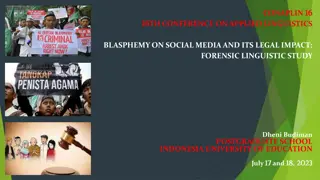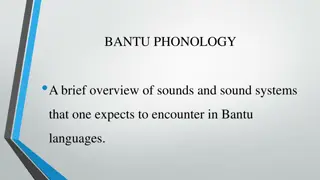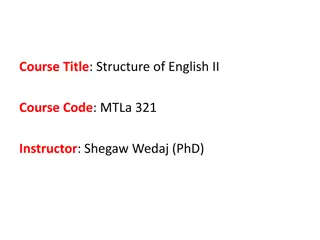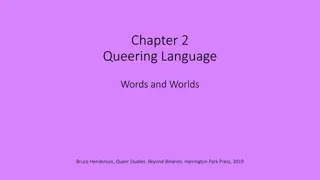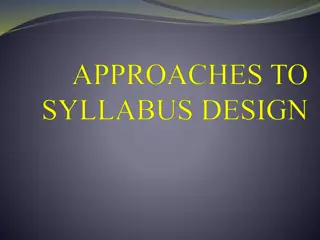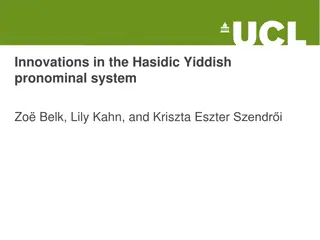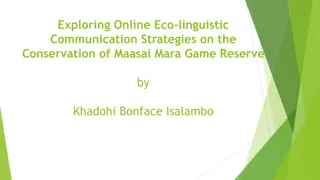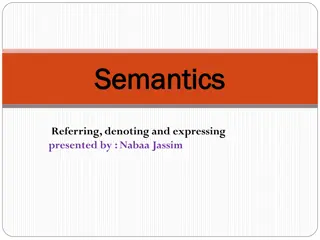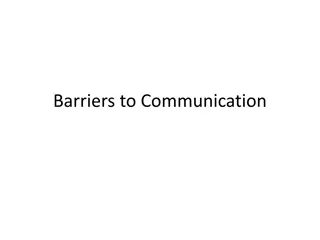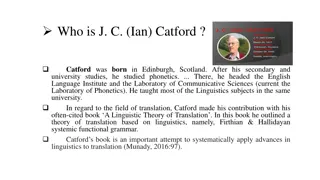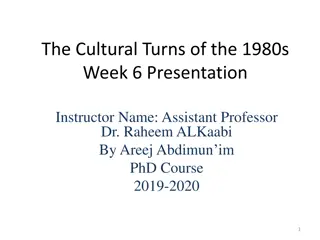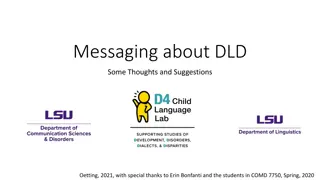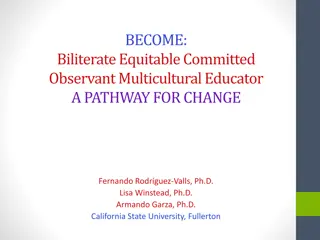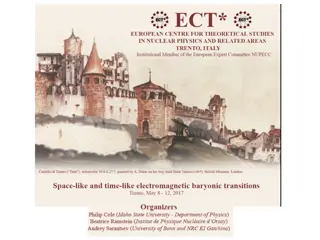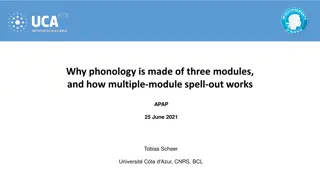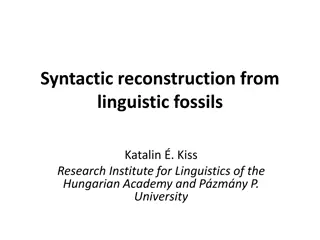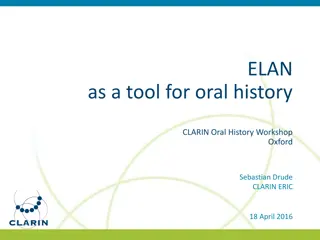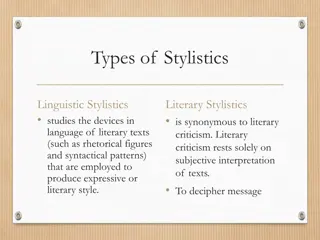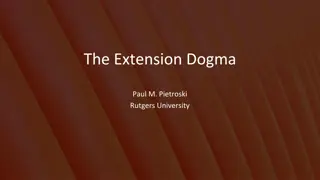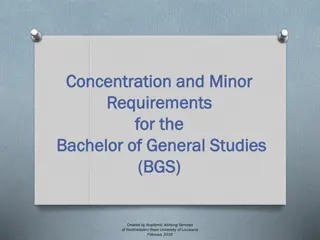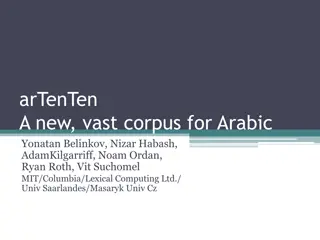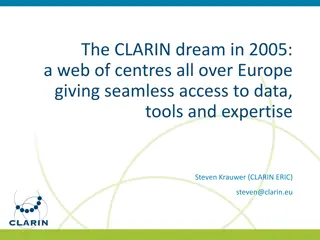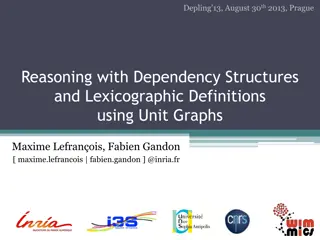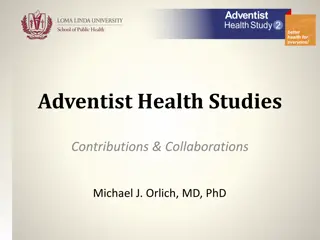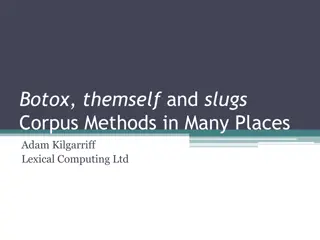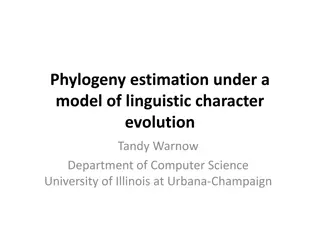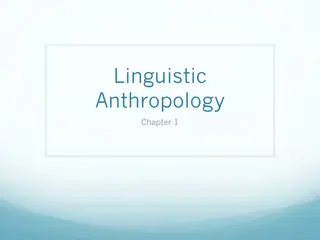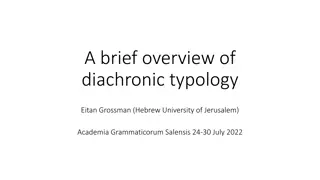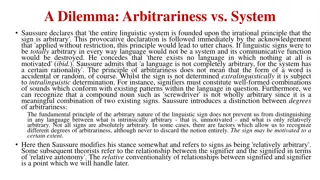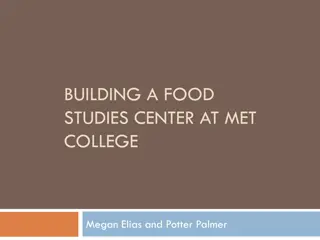Impact of Blasphemy on Social Media: Forensic Linguistic Analysis
Language plays a crucial role in human communication, especially on social media platforms where public speech can have legal consequences. This research delves into the concept of blasphemy on social media and its legal implications, focusing on linguistic forensic study. It explores how language c
7 views • 24 slides
The Significance of Media in Language Learning
Media plays a crucial role in language learning by raising awareness of the ideology behind linguistic structures and providing valuable information on society and culture. Linguists are drawn to media language for research purposes and to understand its impact on language use and attitudes. Media s
12 views • 5 slides
Overview of Stilistik in Bachelor's Studies
Stilistik in a Bachelor's program covers theoretical basics, stylistic concepts, micro and macro stylistics, and key texts in the field. It explores stylistic analysis, linguistic disciplines, communication styles, and the impact of style on various forms of expression including everyday communicati
6 views • 63 slides
Latest Research and Studies on Lung Cancer - Update May 2024
This research update includes information on national recruitment to lung cancer studies, comparison of national vs. regional recruitment, and detailed descriptions of various studies and trials related to lung cancer. The studies cover areas such as treatment advancements, observational studies, ma
2 views • 13 slides
Exploring Bantu Phonology and Linguistic Classification
Delve into the intriguing world of Bantu phonology and linguistic classification, covering the diverse sounds and phonological processes found in Bantu languages. Discover the rich heritage of over 500 Bantu languages in sub-Saharan Africa, classified into zones and classes, shedding light on the fa
0 views • 38 slides
Understanding Structural Linguistics: An Exploration of Language and Signs
Delve into the intricate world of structural linguistics through an in-depth analysis of language components, linguistic signs, and the relationship between language and linguistics. Explore the concepts of syntagmatic vs. paradigmatic relations, linguistic signs as associations of sound and meaning
4 views • 62 slides
Exploring Pragmatics in Linguistics Studies
Pragmatics delves into the study of implied meanings and how we interpret language in various contexts. It focuses on understanding communication beyond explicit words and explores the invisible meanings conveyed through situational and linguistic contexts. Deixis, physical context, and linguistic c
0 views • 41 slides
Exploring Queer Language and World
Examining the linguistic aspects of queerness, this content delves into the history and evolution of terms like queer and homosexual. It discusses the reclaiming of queer identity, its association with leftist politics, and the linguistic reclamation process. Various perspectives on queer terminolog
0 views • 24 slides
Understanding Language Teaching Syllabus: Integration, Theory, and Approaches
Language Teaching Syllabus involves the integration of subject matter and linguistic elements, guided by theories of language and learning. Various approaches like Grammatical, Situational, Communicative, and Analytic are used to structure syllabi. Breaking language into parts aids in sequential lea
1 views • 28 slides
Innovations in Hasidic Yiddish Pronominal System
Explore the evolution of pronouns in the Hasidic Yiddish language system, showcasing simplifications and changes over time. The research delves into the linguistic characteristics of Hasidic Yiddish speakers in Stamford Hill, London, highlighting the influences of various Hasidic groups and geograph
1 views • 24 slides
Overview of Media Studies Disciplines and Historical Development
Media studies is a multidisciplinary field that explores the content, history, and effects of various media, with roots in the relationship between media and culture. Originating in the 1920s, media studies draws on traditions from social sciences and humanities, incorporating theories from discipli
5 views • 18 slides
Strategies for Online Eco-Linguistic Communication in Maasai Mara Conservation
Maasai Mara faces threats from human encroachment, prompting conservation efforts. This study explores online eco-linguistic strategies for engaging the public in conservation activities. The importance of language in online communication to achieve ecological harmony is highlighted, emphasizing eco
0 views • 17 slides
Understanding Semantics: Exploring Linguistic Meaning and Expression
Exploring the realm of semantics, this content delves into how language is used to refer, denote, and express concepts in the world. It discusses the importance of linguistic meaning, different approaches to studying it, and the distinction between denotational and cognitive semantics. By examining
1 views • 7 slides
Understanding and Overcoming Communication Barriers
Communication barriers, such as physical, linguistic, cultural, mechanical, organizational, and psychological factors, can hinder effective message transmission and understanding. Physical barriers like noise and environmental stress, linguistic barriers including language ambiguity and jargon, cult
0 views • 11 slides
Understanding J.C. Catford's Linguistic Theory of Equivalence in Translation
J.C. Catford, a prominent figure in translation studies, developed a theory of equivalence in translation based on functional linguistics. His work emphasizes the process of substituting text from one language to another, focusing on formal and textual equivalence. Catford's theory sheds light on ho
2 views • 12 slides
The Cultural Turns of the 1980s in Translation Studies
This presentation explores the various cultural turns in Translation Studies during the 1980s, highlighting key scholars such as Snell-Hornby and Even-Zohar. It discusses the linguistic turn, pragmatic turn, and the significance of cultural studies in understanding translation processes, particularl
0 views • 30 slides
Understanding Clinical Trials: Types and Designs
Clinical trials are essential research studies that evaluate new tests and treatments to improve human health outcomes. They involve various phases, designs, and purposes, such as treatment trials, prevention trials, and observational studies. Different types of clinical trial designs include experi
7 views • 18 slides
Linguistic Microaggressions in Messaging about DLD: Thoughts and Suggestions
Linguistic microaggressions in the discourse surrounding Developmental Language Disorder (DLD) can perpetuate negative stereotypes and harm individuals. This content discusses the concept of linguistic microaggressions, explores the ambiguity in messaging about DLD, and highlights the importance of
3 views • 12 slides
Culturally Responsive Biliteracy in Inclusive Education
Culturally responsive biliteracy in inclusive education emphasizes the importance of teaching in two languages, valuing diverse cultural and linguistic identities, and creating a participatory and inclusive classroom environment. Educators play a crucial role in fostering language development and ac
0 views • 12 slides
Hematological Cancer Clinical Studies Update and Recruitment Statistics
Latest update on hematological cancer clinical studies from the SWAG.Network Haematological Cancer Clinical Advisory Group, including national recruitment data, regional recruitment comparisons, open studies, and sample size information for ongoing studies. This comprehensive update covers a range o
0 views • 14 slides
Advances in Baryon Spectroscopy and Hadronic Matter Studies
Discussions at the meeting focused on interpreting HADES results for e+e- and meson production in hadronic reactions, with studies involving proton, pion, light, and heavy ion beams. The role of time-like electromagnetic transitions, baryon spectroscopy, and connecting hadronic matter studies were e
0 views • 12 slides
The Three Modules of Phonology and Multiple-Module Spell-Out Systems
Phonology is structured into three modules - Sonority, Laryngeal, and Place - each with its own vocabulary and skeleton for computation. These modules interact in multiple-module spell-out systems to map linguistic structures onto phonetic realizations. Sonority, involving the audibility of linguist
0 views • 67 slides
Syntactic Reconstruction from Linguistic Fossils in Uralic Languages
Linguistic fossils provide valuable insights for syntactic reconstruction in Uralic languages like Hungarian, Eastern Khanty, and Samoyedic. Through a case study, constraints on topical objects and grammatical systems are examined using linguistic fragments.
0 views • 34 slides
ELAN as a Tool for Oral History Workshop Summary
ELAN, a tool developed over 15 years at the Max-Planck-Institute for Psycholinguistics, is utilized in various research contexts like language documentation, acquisition studies, gesture studies, and sign language studies. The workshop covers the introduction to ELAN, basic and advanced features, an
0 views • 14 slides
Understanding Linguistic and Literary Stylistics
Linguistic Stylistics explores devices in language of literary texts to create expressive styles. Literary criticism relies on subjective interpretation, while Stylistic Analysis in linguistics identifies patterns in speech and writing. This content delves into the phonological, graphological, and l
0 views • 17 slides
Understanding Targeted Clinical Investigation in Pharmacovigilance
Targeted clinical investigation plays a crucial role in pharmacovigilance by further evaluating significant risks identified in pre-approval clinical trials. This involves conducting pharmacokinetic and pharmacodynamic studies, genetic testing, interaction studies, and large simplified trials to ass
0 views • 12 slides
The Extension Dogma: Exploring Meaning and Extensions in Linguistic Expressions
The Extension Dogma challenges the assumption that linguistic expressions inherently possess meanings. Instead, it posits that expressions have extensions without necessary meanings that determine them. Theories of meaning should focus on the extensions of expressions, while psychological studies of
0 views • 30 slides
Concentration and Minor Requirements for Bachelor of General Studies (BGS)
Bachelor of General Studies (BGS) students at Northwestern State University of Louisiana must complete a concentration consisting of 36 hours, with a minimum of 12 hours at the 3000 and 4000 levels taken at NSU. The popular concentrations are Social Science, Computer & Natural Science, and Arts & Co
0 views • 9 slides
Introduction to arTenTen: A New Vast Corpus for Arabic Linguistic Processing
arTenTen is a new corpus for Arabic containing a vast array of text types, rich metadata, and clean linguistic processing capabilities. It offers a significant improvement over existing Arabic corpora, presenting a larger dataset with a variety of linguistic features. The corpus is fully processed,
0 views • 8 slides
Exploring the CLARIN Dream: Language, Data, and Expertise Across Europe
The CLARIN project, initiated in 2005, aims to provide seamless access to data, tools, and expertise through a network of centres across Europe. By leveraging interoperability standards, researchers can consult catalogues, access text collections, and analyze linguistic resources from various countr
0 views • 5 slides
Reasoning with Dependency Structures and Lexicographic Definitions using Unit Graphs
This piece discusses the application of knowledge representation in addressing recurrent needs related to manipulating, querying, reasoning, and sharing information, particularly in the linguistic domain of Meaning-Text Theory. Maxime Lefrançois and Fabien Gandon explore formalisms, such as the the
0 views • 56 slides
Exploring Pesticide Monitoring and Contamination Studies in Maine
Mary Tomlinson's work with the Maine Board of Pesticides Control includes past studies on groundwater and surface water monitoring, ongoing monitoring initiatives, and future collaborative studies. The State Law mandates residue surveys to identify possible contamination sources and develop a pestic
1 views • 55 slides
Adventist Health Studies Contributions & Collaborations Overview
Adventist Health Studies have made significant contributions to understanding the health and longevity advantages of Seventh-day Adventists, particularly focusing on vegetarian diets and cardiovascular health. With a history spanning over 57 years and various cohort studies, these studies have provi
0 views • 12 slides
Understanding Structuralism in Linguistics: An Overview
Structuralism emerged as a dominant approach in linguistic studies from the 1920s to the 1960s, led by figures like Ferdinand de Saussure. This philosophical perspective focused on the study of language as a stable system of signs, emphasizing the interrelation of mental representations of sounds an
1 views • 28 slides
Understanding Linguistic Features in Trademarks and Branding
Explore the nuances of linguistic features in trademarks and branding through topics such as generic vs. name-like words, trade mark infringement cases, capitalization norms, and the significance of corpus analysis in understanding language usage in branding. Discover how linguistic expertise plays
0 views • 22 slides
Evolution of Indo-European Languages through Phylogeny Estimation
Explore the evolution of Indo-European languages through phylogeny estimation under a model of linguistic character evolution. Follow the Computational Historical Linguistics Project's collaboration that began in 1994, leading to the development of methods and studies on homoplasy-free evolution and
0 views • 61 slides
Understanding Linguistic Anthropology and Anthropology: A Comprehensive Overview
Delve into the realm of linguistic anthropology and anthropology to explore the study of humans, culture, language, biology, artifacts, and more. Discover the four fields of anthropology, the holistic approach, and the importance of cultural relativism while avoiding ethnocentrism. Learn how linguis
0 views • 25 slides
Exploring Diachronic Typology and Linguistic Diversity
Delve into the fascinating realm of diachronic typology and linguistic properties across languages in time and space. Uncover the distribution of linguistic features, the past tense in various languages, and the underlying constraints shaping language structures. Discover the intricate interactions
0 views • 99 slides
The Principle of Arbitrariness in Linguistic Signs: Saussure's Insight
Saussure's declaration on the arbitrariness of linguistic signs is thought-provoking, emphasizing that while signs are arbitrary, complete arbitrariness would lead to chaos. He distinguishes between degrees of arbitrariness and acknowledges that signs are not entirely arbitrary, being subject to lin
0 views • 9 slides
Building a Food Studies Center at Met College
Establishing a Food Studies Center at Met College, driven by the merging of Food and Wine courses with Gastronomy programs, aims to integrate hands-on and academic approaches to food studies. Drawing inspiration from existing models like the Culinaria Research Centre and the Center for Regional Agri
2 views • 8 slides
